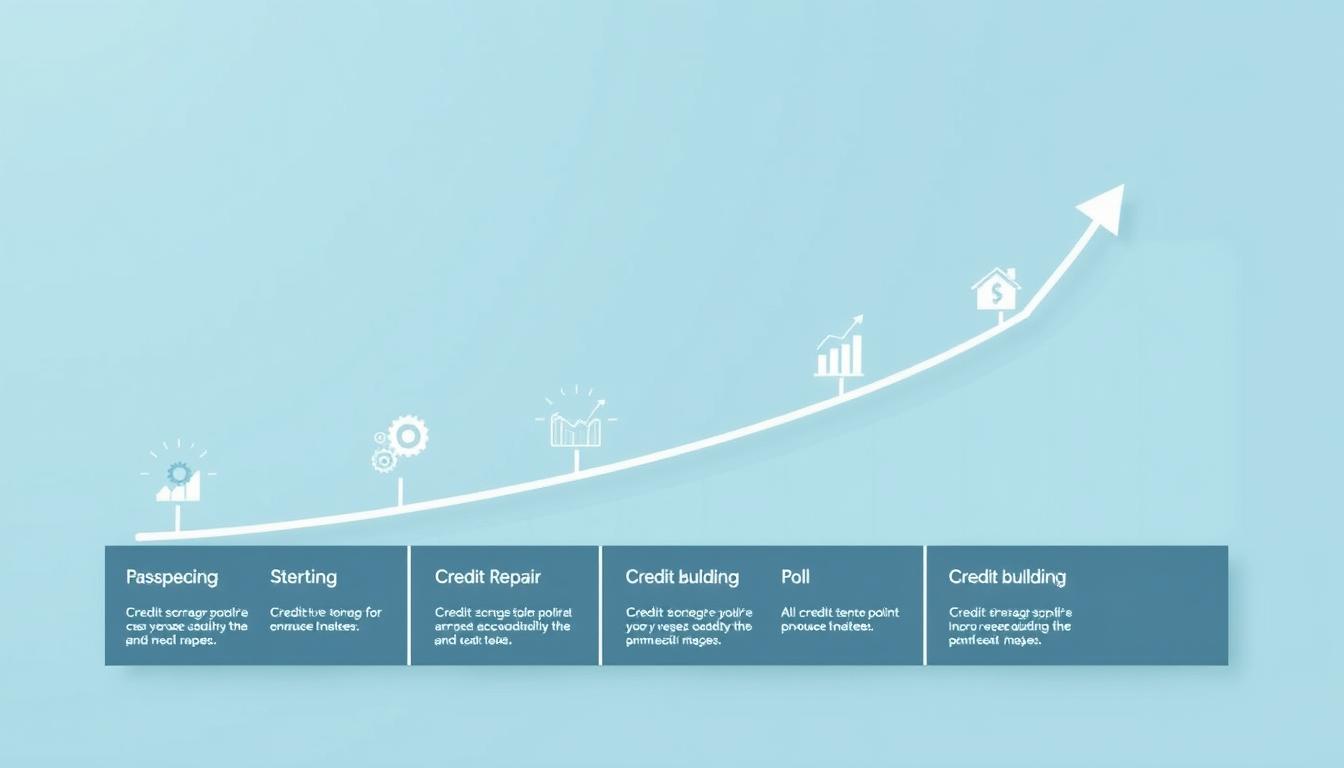Here’s the rewritten content for the paragraph enclosed in p tags:
Boosting your credit score opens doors to better financial opportunities. It helps you secure loans and get the best interest rates. This article compares credit repair and credit building strategies. We’ll help you choose the best approach for your financial health.
We’ll explore why a good credit score matters. You’ll learn how to spot and dispute errors on your credit report. We’ll also share effective DIY methods for credit repair and building.
Understanding Credit Repair and Credit Building
Credit repair and credit building are two ways to boost your financial standing. They differ in their focus and strategies. Let’s explore these approaches to help you make informed decisions.
What is Credit Repair?
Credit repair tackles negative items on your credit report. It addresses errors, inaccuracies, or outdated information. You can dispute issues with credit bureaus or work with a credit repair company.
This process aims to improve your credit score. It can help restore your credit profile quickly.
What is Credit Building?
Credit building focuses on creating a positive credit history. It improves your creditworthiness over time through responsible credit management. This includes making on-time payments and keeping credit card balances low.
The goal is to show you can manage credit responsibly. It builds a solid foundation for your financial future.
| Credit Repair | Credit Building |
|---|---|
| Addresses negative items on your credit report | Focuses on establishing a positive credit history |
| Aims to improve your credit score quickly | Builds creditworthiness over time |
| Can be done through disputes or credit repair services | Achieved through responsible credit management |
“Successful credit repair and credit building require a comprehensive understanding of your financial situation and a strategic approach to address your unique needs.”
Both credit repair and credit building aim to enhance your financial well-being. They can open up more opportunities for your future. Choose the approach that best fits your unique financial situation.
Credit Repair vs Credit Building
Improving your credit score offers two main options: credit repair and credit building. These strategies differ in their approaches and timelines. Both can lead to a better credit profile.
Credit repair tackles negative items on your credit report. It can result in quicker score improvements by resolving these issues. Credit repair services often handle disputes and negotiations with creditors.
Credit building focuses on developing positive credit habits over time. This involves opening new accounts and making timely payments. It also means keeping credit utilization low.
Credit building progress may be slower. However, it can lead to lasting credit score improvements. It helps establish a strong financial foundation for the future.
| Credit Repair | Credit Building |
|---|---|
| Focuses on addressing negative items on your credit report | Emphasizes developing positive credit habits over time |
| Can result in faster score improvements | May have a slower timeline, but leads to sustainable credit score improvements |
| Credit repair services can handle disputes and negotiations with creditors | Requires personal effort in opening new accounts, making on-time payments, and maintaining low credit utilization |
Your choice depends on your financial situation and goals. Understanding each strategy’s benefits and limits is crucial. This knowledge helps you pick the best approach to boost your credit score.

The Importance of a Good Credit Score
Your credit score is a powerful three-digit number. It affects your ability to get loans and favorable interest rates. A good score can help you buy a home or start a business.
A poor credit score can limit your options and increase costs. Understanding its importance is crucial for improving your financial health. A strong credit score impacts financial opportunities, loan approvals, interest rates, and insurance premiums.
“Your credit score is one of the most important numbers in your financial life. It can make the difference between getting approved for a loan or credit card, or being denied.”
Building a positive credit history opens doors to better financial opportunities. It ensures you get the best interest rates and insurance premiums. Take proactive steps to improve your credit score.
| Credit Score Range | Impact on Financial Opportunities |
|---|---|
| 800-850 | Excellent credit, providing the best access to loans, credit cards, and favorable interest rates. |
| 700-799 | Good credit, generally qualifying for most loans and credit cards with competitive rates. |
| 600-699 | Fair credit, may face challenges in obtaining loans or credit cards, and higher interest rates. |
| 500-599 | Poor credit, significantly limiting financial opportunities and resulting in higher costs. |
Maintaining a good credit score unlocks a world of financial opportunities. It affects loan approvals, interest rates, and insurance premiums. Understanding this vital metric helps you control your financial future.

credit repair vs credit building
Both credit repair and credit building can boost your financial health. Each method has its advantages. Let’s explore how they can help you make smart money choices.
Credit Repair Benefits: Credit repair can quickly raise your credit score. It fixes errors and fraud on your credit report. This can lead to better interest rates and loan approvals.
Credit Building Strategies: Credit building takes longer but creates lasting habits. It focuses on timely payments and low credit card balances. This approach leads to steady, long-term credit score growth.
| Credit Repair | Credit Building |
|---|---|
| Faster credit score improvement | Slower but more sustainable credit score improvement |
| Focuses on resolving credit report errors and inaccuracies | Emphasizes developing positive credit habits over time |
| May incur costs for credit repair services | Can be achieved through various strategies, often with minimal or no costs |
Your choice depends on your financial goals and timeline. Consider credit repair benefits and credit building strategies carefully. This will help you improve your credit score and overall money management.

Disputing Inaccuracies on Your Credit Report
A strong credit profile relies on an accurate credit report. Spotting and disputing errors on your credit reports is key to credit repair.
Identifying Errors and Inaccuracies
Check your reports from Experian, Equifax, and TransUnion for credit report errors. Look out for these common mistakes:
- Accounts you did not open
- Incorrect account information, such as balances, payment history, or credit limits
- Duplicate entries for the same account
- Outdated or inaccurate credit information that should have been removed
- Unauthorized hard inquiries or credit checks
A thorough review helps spot these credit report errors. Once found, you can dispute them with the credit bureaus.
Fixing credit report errors is crucial for credit repair. It helps you take charge of your credit. This process can lead to a stronger credit profile.
| Reason for Dispute | Credit Bureau Action | Potential Impact |
|---|---|---|
| Accounts you did not open | Investigate and remove the account | Increase your credit score by reducing your credit utilization ratio |
| Incorrect account information | Investigate and correct the inaccurate information | Improve your credit history and payment record |
| Outdated or inaccurate credit information | Remove the outdated or inaccurate information | Enhance your credit report and credit score |
| Unauthorized hard inquiries | Investigate and remove the unauthorized inquiry | Reduce the negative impact on your credit score |
Reviewing and disputing errors on your credit reports is vital. This step can greatly improve your credit profile. It sets you up for financial success.
Building Credit from Scratch
Starting with little or no credit history? Building credit from scratch can be a smart move. You might get a secured credit card, take out a credit-builder loan, or use alternative credit data.
Services like Experian Boost can add rent and utility payments to your credit profile. By managing credit responsibly, you can build a positive building credit history over time.
Let’s explore some effective ways to build credit from the ground up:
- Apply for a secured credit card. These cards need a refundable security deposit, which becomes your credit limit. Use the card wisely and pay on time to build good credit.
- Consider a credit-builder loan. These loans help people with limited credit establish a record. You make monthly payments while the loan amount stays in an account.
- Leverage alternative credit data. Services like Experian Boost can add your utility and rent payment history to your credit profile. This may boost your credit score.
Building credit takes time and patience. But with smart moves and good money habits, you can improve your credit steadily.
| Strategy | Description | Potential Benefits |
|---|---|---|
| Secured Credit Card | Requires a refundable security deposit as your credit limit. | Helps establish a positive building credit history with responsible usage and timely payments. |
| Credit-Builder Loan | Loan amount is held in an account while you make monthly payments. | Reported to credit bureaus, can help build credit-builder loans. |
| Alternative Credit Data | Incorporating utility, rent, and other recurring payments into credit profile. | Can potentially boost your credit score by including alternative credit data. |

“With patience and responsible financial habits, you can establish a solid credit foundation and unlock new opportunities.”
Responsible Credit Management
Responsible credit management is vital for long-term credit health. It includes keeping low credit card balances and making timely payments. Diversifying your credit mix and monitoring your reports are also crucial steps.
Improving Financial Habits
Sound financial habits can boost your credit profile. Create a budget and cut unnecessary spending. Address outstanding debt effectively to build a strong financial foundation.
| Credit Management Strategies | Benefits |
|---|---|
| Maintain low credit card balances | Reduces credit utilization, a major factor in your credit score |
| Make on-time payments | Positively impacts your payment history, another vital component of your credit score |
| Diversify your credit mix | Demonstrates your ability to manage different types of credit, such as credit cards, loans, and mortgages |
| Monitor your credit reports regularly | Helps you identify and address any credit monitoring issues or inaccuracies |
| Develop a budget and reduce debt | Improves your overall financial education and financial stability |
These strategies can help build a strong credit profile. By applying them, you’ll be on track for long-term financial success. Your improved habits will pave the way for a healthier financial future.
The Role of Credit Repair Services
Improving your credit can be done alone or with credit repair companies. DIY credit repair is cheaper, but professional services offer unique benefits.
Credit repair services speed up the credit dispute process. They know the credit reporting system well. This expertise can lead to faster fixes for credit report errors.
These companies offer thorough credit report analysis. They spot areas to improve and create custom plans. This guidance is helpful for those new to credit management.
| Pros of Credit Repair Services | Cons of Credit Repair Services |
|---|---|
|
|
Be aware of the downsides of credit repair services. Results aren’t guaranteed, and credit repair costs can be high. It’s vital to check a company’s ethics and effectiveness.
Your choice depends on your needs, goals, and finances. Consider the pros and cons carefully. This will help you find the best way to boost your credit.
DIY Credit Repair and Building Strategies
Want to improve your credit yourself? Try these DIY credit repair and building strategies. They can help you save money and boost your financial standing.
Regularly Review Your Credit Reports
Check your credit reports often. This is key for DIY credit repair. Look at reports from Experian, Equifax, and TransUnion.
Find errors that may hurt your credit score. This process is called a credit report review.
Dispute Credit Bureau Errors
Found mistakes on your credit reports? Dispute them with the credit bureaus. This credit bureau dispute process needs proof to back your claim.
If successful, negative items can be removed. This can lead to a better credit score.
Utilize Credit-Building Techniques
Use credit building techniques to improve your score over time. Become an authorized user on a trusted person’s credit card.
Or, get a secured credit card. This can help build a positive credit history.
Managing your credit yourself can save you money. It also helps improve your financial health and creditworthiness.
Conclusion
Understanding credit repair and credit building is key to improving your credit. Your financial situation will determine the best approach. By considering each method’s pros and cons, you can take control of your credit profile.
Dedication is crucial whether you use a credit repair service or improve credit yourself. Address inaccuracies on your report and develop good financial habits. These steps can boost your credit score and overall financial health.
Credit repair and building often work together to achieve your goals. Stay informed and make smart choices. Take proactive steps to improve your credit score and secure a better financial future.
FAQ
What is the difference between credit repair and credit building?
What are the benefits of credit repair and credit building?
How can I dispute errors and inaccuracies on my credit report?
What strategies can I use to build credit from scratch?
How do I manage my credit responsibly?
Should I work with a credit repair service or take a DIY approach?
Source Links
- Should You Use a Credit Repair Service? – Experian – https://www.experian.com/blogs/ask-experian/should-you-use-credit-repair-service/
- Pros And Cons Of Credit Repair | Bankrate – https://www.bankrate.com/personal-finance/debt/pros-and-cons-of-credit-repair/
- Credit Repair Companies vs. DIY Credit Repair | Chase – https://www.chase.com/personal/credit-cards/education/build-credit/credit-repair-solutions

